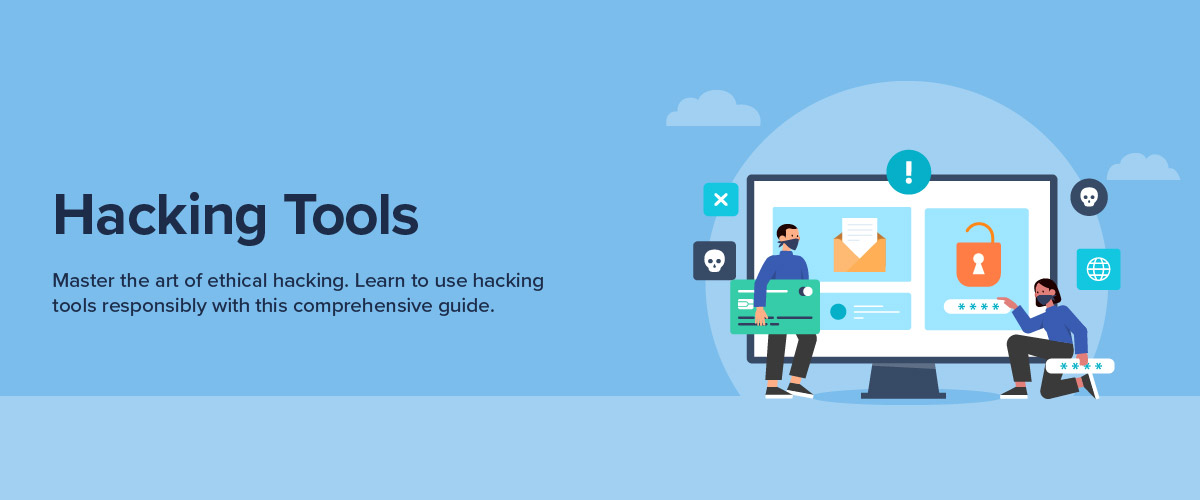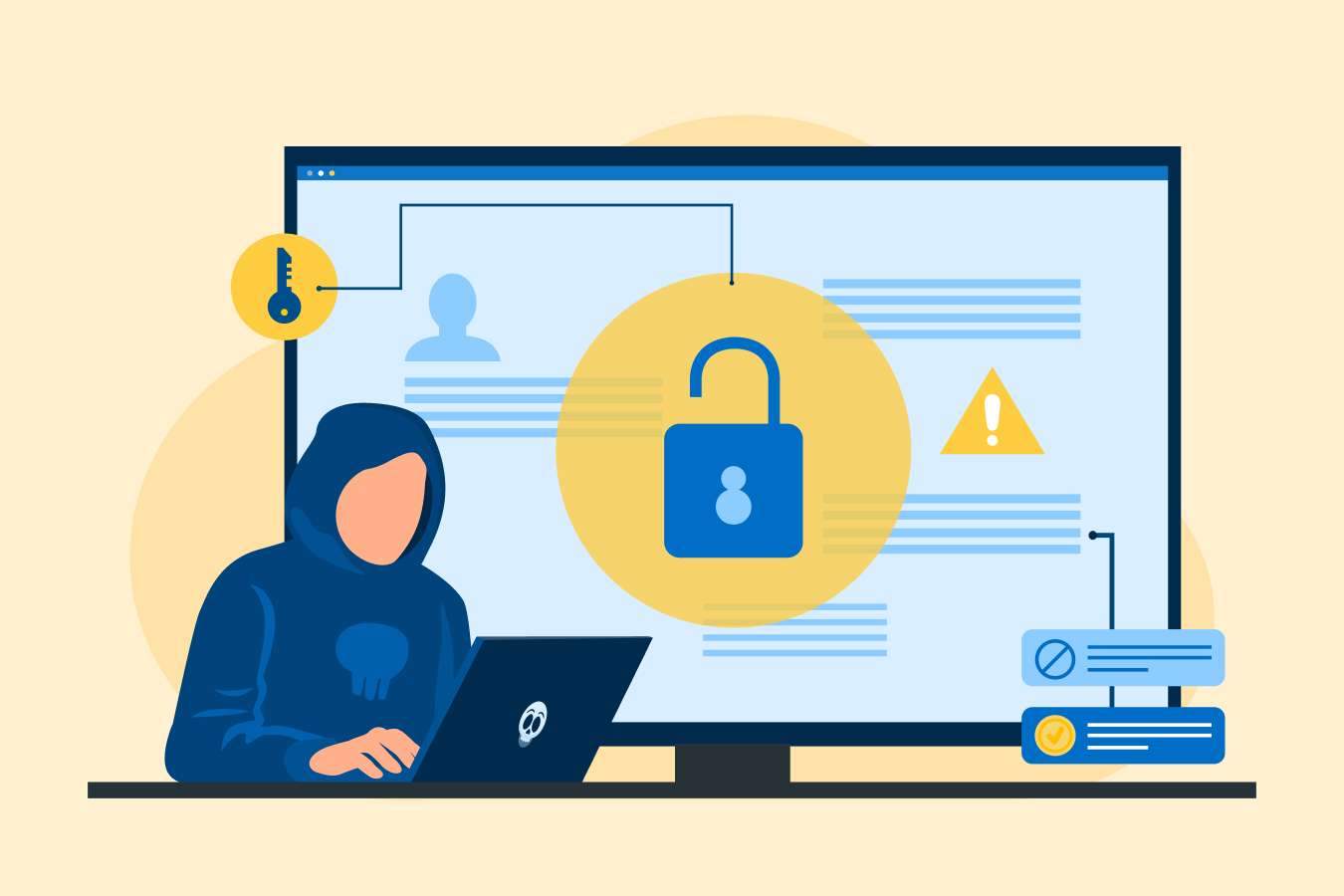20 Best Hacking Tools and Software for Ethical Hackers to Use in 2025
Privacy and security are the two most important issues brought on by digitization and internet awareness. Some cybercriminals get into the servers of any organization and obtain confidential and sensitive data. That is why every organization requires an ethical hacker to guarantee its security system is in sync with the current security standards. In this blog, we will learn the best hacking tools that help ethical hackers achieve this. According to reports, the cyber security market is growing and is expected to reach US$162.00 billion in revenue in 2024.
What is Ethical Hacking?
Ethical hacking is a legal way to obtain unauthorized access to the network, computer system, sensitive data, or application of a white-hat hacker. The white-hat hacker replicates the tactics a hacker uses to get vital information. This is basically done to identify the security lapses so that the white-hat hacker can fix them before the hackers can exploit them.
In today’s time, certified ethical hackers are vital for any business. They help identify and eliminate any vulnerabilities and maintain regulatory compliance.
Also Read: Ethical Hacking Complete Guide
20 Best Ethical Hacking Tools and Software List
Below is a detailed analysis of some of the top list of tools for ethical hacking:
1. Acunetix
Acunetix is an automated ethical hacking software and online application security tester. It looks for vulnerabilities, such as cross-site scripting, SQL Injection, and others. You can also use it for auditing your web applications. Acunetix scans the web application and website that can be accessed via a web browser. It uses HTTP/HTTPS protocol. It comes with a scanner that can virtually locate any file; this feature is highly vital because if the file is not found, it cannot be checked.
2. Nmap
Network Mapper or Nmap is one of the popular ethical hacking tools and is used to scan networks. It has features such as operating system detection, service discovery, and host discovery. When crafting a hack, knowing the IP-related details, the device’s operating system, and open ports is vital. All these features can be quickly implemented in the scripts and can also be used to speed up the process and lead to advanced service detection. Hackers use Nmap to scan networks for weak spots and learn about potential hacks.
To learn more about ethical hacking tools in detail and how ethical hacking works, you can opt for an ethical hacking course.
3. Metasploit
It is one of the open-source pen-testing best hacking software. It works as a public resource that helps develop code and research security vulnerabilities. With the help of this feature, the network administrator can break into the network and identify the risks. Another advantage of Metasploit is beginners can use this tool to practice their skills. They can also replicate the websites for social engineering or phishing purposes. The Metasploit framework can avoid detection systems, perform remote attacks, and scan for security vulnerabilities.
4. Nikto
Nikto is an open-source hacking tool that can analyze web servers and detect vulnerabilities. With the help of Niko, ethical hackers can quickly detect malicious files and outdated components. It also provides HTTP proxy support. Niko can detect if there are any default installation files or outdated software applications. It can also be easily integrated with the Metasploit framework.


5. John The Ripper
John The Ripper is one of the tools for ethical hacking for password cracking. With the help of this tool, you get several customization options for password cracking. John The Ripper tests the strength of the encrypted password. One of the primary benefits of using this tool is its fast speed with which it can crack passwords. Another added advantage is that it is an open-source application that can be used with any operating system, be it Android, windows, Mac, or Linux.
6. NetBIOS
NetBIOS is a service that is non-routable and lets the applications on the device communicate over the LAN with other devices. Even when NetBIOS is not used, it runs on the operating system. Its enumeration lets the hackers initiate a DoS attack or write or read to a remote system.
7. Sqlmap
SQL injection tricks the SQL database of a web application to alter or reveal its value. SQLmap facilitates SQL injection attacks. It is an open-source ethical hacking tool that detects SQL injection attack vulnerabilities quickly. Also, it supports a wide range of SQL-based systems.
8. Wireshark
Two crucial factors that are important to carry out a successful sniffing attack are Packet monitoring and Network sniffing. The critical factor in detecting suspicious attacks in packers is to assess the packet’s content. One of the free tools for hacking, Wireshark, is the best choice for packet analysis. It has a convenient user interface and is one of the most accessible tools. It has colour code features that help the users identify the packet’s contents.
9. Intruder
It is an automated scanner that can identify any weakness in cybersecurity and help get the remediation. Intruder provides around 9k security checks, making it easy for companies to scan the vulnerability. It checks misconfigurations, cross-site scripting, missing patches, SQL injection, etc. It also helps the users save time by proactively scanning the system for the latest vulnerabilities.
10. Invicti
Invicti was previously known as Netsparker and is a highly accurate hacking software. It can easily replicate the hacker’s moves and identify the vulnerabilities such as cross-site scripting and SQL injection in web APIs and web applications. It saves time as the user does not manually have to verify the identified vulnerabilities. It is available as an online service and as Windows software.
11. Burp Suite
The popularity of Burp Suite owes much to its advanced web application security testing features. Built upon capabilities like vulnerability scanning, traffic modification, and manual testing, Burp Suite serves an array of security needs with ease. It is well suited to the requirements of professionals working manually or using automation techniques.
12. Aircrack-ng
Assessing how secure Wi-Fi networks are is critical in the domain of cybersecurity. One essential tool that professionals use for this task is Aircrack-ng. This tool mainly focuses on capturing packets and analyzing wireless network traffic as it helps identify potential threats. Furthermore, with its ability to crack into both WEP and WPA/WPA2-PSK keys, Aircrack-ng allows testers to pinpoint weak areas within any given wireless configuration challenge effectively.
13. Hashcat
Hashcat is one of the popular ethical hacking tools, It can crack different types of password hashes via brute-force methods or employ dictionary and hybrid attacks. With support for multiple hashing algorithms and remarkable proficiency in securing passwords, this dynamic tool proves indispensable in assessing the strength of passwords.
14. Maltego
Regarding data mining and information gathering tools, Maltego is a good option specifically suited for reconnaissance and footprinting purposes. Through this technology, security professionals can gather intelligence more efficiently than before. This tool has the unique ability to visually represent relationships among different entities at present. Users benefit from this feature because they can quickly map out an organization’s infrastructure using Maltego.
15. Hydra
For anyone looking to improve their authentication mechanisms’ security against brute-force and dictionary attacks, Hydra is an excellent choice. This efficient network login cracker allows you to test the strength of passwords through different protocols like HTTP, FTP SSH, and Telnet while easily identifying weaknesses within the system.
16. OWASP ZAP
OWASP open-source framework works diligently to identify common vulnerabilities, including cross-site scripting (XSS), SQL injection, and insecure direct object references by actively scanning web applications. Furthermore, its list of available features includes capabilities for intercepting and modifying HTTP requests. Thus, these features make it a highly effective tool for enhancing general website safety precautions.
17. Social-Engineer Toolkit (SET)
Organizations can use this kit as a framework for carrying out social engineering attacks. With different attack vectors on hand like spear-phishing, credential harvesting, and website cloning, SET can replicate everyday social engineering scenarios realistically. SET utilizes and analyzes the human element in security measures and tests an organization’s resistance against these malicious attempts.
18. DirBuster
DirBuster is an effective web application directory and files brute-forcing solution. Through its systematic search process, DirBuster carefully examines common naming conventions and patterns to identify potential vulnerabilities. As such, this tool is particularly useful in discovering inadvertently exposed information like backup or configuration files.
19. BeEF
One useful web application vulnerability scanning tool is BeEF. Primarily used for penetration testing purposes, its main focus lies in exploiting web browser weaknesses effectively. It facilitates assessing client-side applications’ security posture by utilizing tactics tailored precisely for attacking browser and XSS loopholes or other flaws. It offers an array of attack mechanisms that center on browsers for greater flexibility.
20. Malwarebytes
Malwarebytes is an effective and reliable anti-malware tool that provides real-time protection ability, scheduled scanning features, and reliable security against a range of malicious programs such as spyware ransomware, desk lock screens, etc.
Conclusion
Cyberattacks are becoming very common in today’s time, and many corporations have faced these attacks. Therefore, the demand for ethical hackers is at an all-time high. With the help of those mentioned above, some of the best and free hacking tools, ethical hackers can safeguard the confidential details of the organization or individuals.
FAQs
The legitimacy of using tools depends upon the circumstances and objectives behind them. Quite evidently, having such measures illegally or with malicious intent attract legal consequences. If you are considering using tools, it is important to carefully consider the legal implications. You should ensure that you are using the tools for authorized purposes.
Ethical hacking can be challenging to learn due to its complex nature, requiring a strong understanding of computer systems, networking, programming languages, and security concepts. However, with dedication, resources like online courses, tutorials, and practical experience, it is achievable.
The following are the steps to learning to hack legally:
* Begin with a solid foundation in computer networking and security fundamentals.
* Acquire knowledge of programming languages (such as Python).
* Learn about common vulnerabilities and exploits.
* Practice hands-on with legal hacking challenges and platforms.
The best hacking field to learn depends on your interests and goals. Some popular areas include network security, web application security, mobile app security, and wireless security. Choose a specialization that aligns with your passion and career objectives.
Effective hacking software varies depending on the specific tasks and goals, but some commonly used ones include Nmap for network scanning, Metasploit for exploitation and penetration testing, Wireshark for network analysis, Burp Suite for web application testing, and John the Ripper for password cracking.







